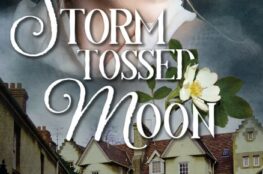(This article was first published in the Summer 2022 edition of The Author, the journal of the Society of Authors.)

‘Maggie Craig! Your language!’ Although I didn’t entirely buy my cousin’s wide-eyed look of shock, I told her it wasn’t my language, it was the characters’ language. If you’re an early 19th century graverobber in old Edinburgh, I don’t think you’re going to say, ‘Oh, drat,’ when you’re disturbed in your midnight work in Greyfriars Kirkyard by a breathless warning from your lookout boy that the constables are on their way.
Likewise, if you’re a Redcoat officer in mid-18th century Edinburgh in pursuit of Jacobite plotters. When your quarry escapes, you’re unlikely to slap your hand against the wall, the words ‘Oh, bother,’ tripping off your tongue. The hero in my Storm over Scotland series is a trooper and he swears like one.
I don’t think I’ve overdone it. Sometimes my Redcoat captain simply ‘mutters a string of curses’. Even when his war wound from Dettingen is playing up. He took a musket ball in the thigh there. Fired, as he puts it, ‘by some misbegotten French bastard.’
I’m old enough to remember when that word was truly shocking. I think it was Callan, a 1960s tv series about a world-weary MI5 agent starring Edward Woodward, which normalised it. Now it can be used almost affectionately. Tolerance changes over time. Take the f-word. It’s widely used on the Internet. Although it’s not yet completely acceptable in other public discourse such as newspapers, I see it creeping in there too.
As part of what we might call industrial language, it’s been swirling around for centuries, in shipyards, the army and other male-dominated workplaces. Travelling down by train from Aberdeen during a very snowy winter a few years back, I sat across the aisle from two men who’d clearly come off one of the rigs. They swore their heads off the whole way. Every second word.
The sparkling snowy scenery on the other side of the window caught their attention, glistening white across the plain and covering Fife’s Lomond hills. ‘Beautiful, int it?’ asked one. His pal heaved a sigh of pleasure. ‘Aye. God’s f***ing country.’
I feel my 18th century Redcoat wouldn’t be authentic if he didn’t sometimes curse. It’s taken me aback how offended some readers are by swearing, to the extent that it colours their whole view of the book. One reader in the UK wrote that she was disappointed by the ‘foul language’ and had put my book in the bin.
I’m glad she didn’t read on to find the one instance in this book of the c-word. She might have turned a flamethrower on my poor novel. That word didn’t come out of my mouth. My hero uses it to show his contempt for the young woman he’s interrogating. He gets his comeuppance when he later falls in love with her.
One American reader of the same book found the ‘modern day profanities mixed with Scottish dialect unsettling.’ I wondered if she thought people in Scotland in the past skipped through an endless Brigadoon and that swearing was a purely modern phenomenon.
Another reader queried whether the f-word was used in the 18th century. Yes. It was. It probably goes back to the Middle Ages. In Scotland, an early record of its use was in the 1500s, in playwright Sir David Lindsay’s Ane Pleasant Satyre of the Three Estaits. The play was revived at the 1948 Edinburgh Festival, and subsequently.
Another US reader found my novel set in 19th century Edinburgh, ‘harsh and not clean.’ She objected both to the graverobber’s swearing and to the sex scenes. As I’ve discovered, there are various categories in American genre romance. At one end of the spectrum, there’s erotic, passionate, steamy. At the other end you find Christian romance and Sweet and Clean romance. Swearing is a no-no, as are love scenes which go beyond kissing. Sometimes I wonder how these people manage to reproduce.
I’ve seen one romantic novel advertised recently as ‘No steam.’ To which the appropriate answer might be that short, sharp four-letter word. Out of interest, I read a Christian romance. Set in the American backwoods in the 19th century, it’s well-written and the love story is indeed sweet and tender. What unsettled me was how the lovers bond over their mutual appreciation of the hero’s lethal hunting rifle.
I find it sad that some people only want to read books which don’t challenge their world view. I fully accept their right to do so but strongly object to how they clearly see themselves as occupying the moral high ground. Sometimes I long to grab these self-appointed moral arbiters by their metaphorical lapels and challenge their self-righteous prejudices.
‘How dare you reduce this book into which I poured my heart and my soul, not to mention my extensive research, as ‘not clean’? How dare you blithely state that you put my book in the bin because you were offended by a few swear words? Don’t you think it’s pathetically judgmental to describe a passionate love story as ‘steamy’?
Ah, well. A writer can dream. Better to mutter a string of curses and move on.


28th November 2022
Bravo.
Beautifully summarized, Maggie.
I chortled through the whole thing.
Ha. Chortle. Another of them Brit words…
29th November 2022
Glad you liked it Scott. I had great fun writing it. And ‘chortle’ is indeed a great word!
29th November 2022
Curses!
I have always read books simply for enjoyment. In respect of the ‘Storm series’
What’s not to enjoy? Total admiration for the research done for the books. I might be old, but I’m not dead and found nothing objectionable about the love scenes between
Robert and Kirsty. Swearing? From a soldier? Some folk are easily upset. What I do find
most objectionable is binning a book.
30th November 2022
Thank, Georgie. I totally agree. Binning a book is not so different from burning one.
22nd February 2023
Hello, I agree swearing and sex definitely have a place in books. However, both can be done ‘tastefully’ – unless smut is what is the reader wishes to find. Then there are those books.
What disappoints me is that you appear to accept swearing as a norm – no matter how offensive. You say you were on a train and two men swore most of the time – you didn’t ask them to tone it down or leave. You apparently just accepted it as normal speech. This to me is not normal and would have been offensive – not to mention if someone can’t form a sentence without swearing what king of an education have they had? I someone drops a brick on my foot I too can swear with the best for a reason!!
I live in a town where swearing is the norm even amongst children as young as five for the sake of it. I think it is disgusting and why should other people have to put up with it. We don’t all subscribe to bad manners. The norm should be good language until a situation requires it to be otherwise.